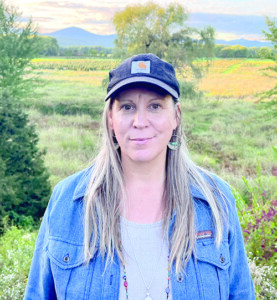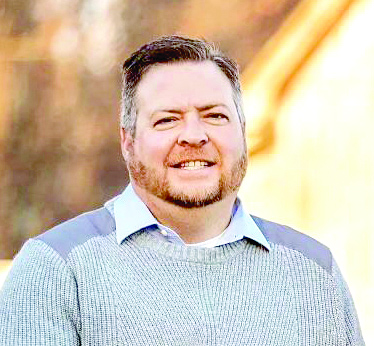On the Ballot: Sekera, Wadsworth battle for HD-82 seat

D — Fryeburg
About the Candidate: I was born the eldest female of nine children to parents working in the field of education, and I am thankful to have been raised in rural Maine.
I am a co-founder of Community Water Justice, a decentralized network of people working for strong water protections at the community level across Maine. I am a founding board member of the Saco Headwaters Alliance, was elected as a Fryeburg Water District Trustee for a few terms, and in 2022 was appointed by the Speaker of the House to the “Commission To Study The Role of Water As A Resource In Maine.”
I am also a journalist with Sunlight Media Collective, a collective of Indigenous and non-indigenous journalists, centering the stories and experiences of Wabanaki people.
I worked in the emergency medical field for 18 years as an administrator of a wilderness medicine school, after working in remote medical clinics and education projects within the conflict zones of Eastern Burma (Myanmar). My work in that region led to serving on the Board of Directors of the U.S. Campaign for Burma in Washington, D.C. doing foreign policy, human rights and environmental justice advocacy.
Most invaluably, I am a mother to my son Luke.
By Wayne E. Rivet
Staff Writer
With the general election just over a month away, The News begins a series of candidate profiles focusing on individuals seeking Maine House of Representatives and the Maine State Senate seats.
This week, the spotlight is on House District 82 — Brownfield, Fryeburg, Hiram, Lovell and Porter — which is a contest between political newcomer Nickie (Nichole) Sekera, a Democrat from Fryeburg, against former HD 82 legislator, Nathan J. Wadsworth, a Republican from Hiram.
The News posed the following questions to the candidates — answers arranged alphabetically:
Q. How did you become interested in political office?
Sekera: I’ve interacted with many state agencies, joint standing committees, and legislators both at the state and federal levels for years in my work, advocating for the health of our people, the environment and for the future of our rural economy.
Recently, however, when a candidate had to withdraw — leaving a one-person race — I was honored to be unanimously nominated by the local caucus to offer the people a choice on November’s ballot. Though I am very late to the race, representing the people of my District is a duty I feel prepared for and will fulfill if elected.
Wadsworth: I had the opportunity to help former State Senator Dave Hastings from Fryeburg during one of his re-election campaigns. That experience showed me some of the ways that an elected official can be of service to their constituents and community, and after having a family, I decided it was time to get more involved in the political process.
Q. What characteristics do you possess that you feel will serve the best interest of your constituents?
Sekera: I am forward thinking in my work and I don’t give up easily. I am earnest, and unafraid in speaking truth to power. I value relationships as the basis of political organizing and appreciate connecting with and understanding others. I am patient and friendly, and enjoy solving challenging problems.
Wadsworth: My experience as a former legislator is my biggest strength. The pre-existing relationships that I have built with commissioners and departments will allow me to get results for constituents immediately. I also think my experience as a business owner, especially in an important Maine industry like Forestry, gives me unique insights into the challenges we are facing as a state such as workforce development/retention, increased inflation which is driving up prices, and the heavy tax burden on Mainers. I would like to put my insights to work so we can lower the everyday cost-of-living for hardworking Mainers.

R — Hiram
About the Candidate: Nate Wadsworth is a small business owner and family man. His roots run deep as a six generation Oxford County resident. He is a graduate of Sacopee Valley High School and holds a Bachelor’s Degree in Economics and Agricultural Business.
He is active in the community including serving in the Maine House of Representatives from 2014-2022.
He resides in Hiram with his wife April and their two children.
Q. Name three issues that concern you the most, and explain why and what can be done?
Sekera: There are several areas of concern that need attention, and the growing housing crisis is one issue that needs to be addressed immediately. We need affordable housing. With the median price of a Maine home now over $400,000 (up 8.2% from last year), home ownership is becoming out of reach for an increasing number of Mainers. According to currently available data, Maine needs nearly 38,500 more homes today, and an additional 37,900 to 45,800 new homes by 2030 to meet expected demands.
In addition to exploring options to increase affordable housing stock as soon as possible, the government has an obligation to better regulate predatory market forces and speculators that are pushing local residents out of their own neighborhoods. I am particularly interested in examining the intersections of the housing crisis with substance use disorder and our growing homeless population.
We need immediate protection measures against water systems privatization and updating laws that protect the public interest. The National Infrastructure Advisory Council is full of conflicts of interest with Wall Street speculators, who recently issued a report that included advocating for the privatization of the nation’s public water systems. These recommendations ring alarm bells for our municipal water systems and water legacy here in Maine, as transferring the control of our precious water resources from the public sector to the private sector has longer-term consequences as higher financing costs put onto the local consumers, increased rates, reduction of local control and public rights.
The private sector is accountable to shareholders over consumers. Municipal Water Districts with elected trustees have direct accountability to local resident ratepayers and a fiduciary responsibility to keep up with infrastructure upgrades and access federal and state funding as necessary. I will continue to advocate for policies that protect the public interest and to maintain our responsibilities and local control of our water sources.
Maine people continue to struggle with inflated costs of food and healthcare and would benefit from a stronger local food system and increased access to better nutrition. Decentralizing our food systems has many benefits including increasing our climate resilience, improving our local economy and decreasing our dependence on imported foods. While many people point to the political party in power for bearing the responsibility of soaring food costs, a root of the current problem is that private equity firms went on a spending spree during the pandemic (they snapped up a record 786 food and beverage companies in 2021 alone), using bundles of debt to pay for their purchases and are now recovering costs and extracting record profits from consumers.
Food prices are predicted to continue rising above the rate of inflation. Private equity was a niche part of our economy until the past few years, and now controls about 40% of our economy. Investing in locally grown, direct consumer relationships will be increasingly important and our rural, sustainable farming practices and businesses should be supported in building a more regenerative economy.
Wadsworth: Addressing the high cost of taxes. At the state level, we have to do a better job at being fiscally responsible and provide some real tax relief for Mainers who are feeling the strains of the current inflation and volatile economy. My first two-year state budget that I supported in 2015 was $5.8 billion…now the state budget is $11.5 billion dollars. It has doubled in less than a decade. We are on an unsustainable path with no end in sight.
Addressing the high cost of electricity. Since 2020, our electricity costs have grown by 24%. Much of this cost can be attributed to the high subsidies of solar farm construction. There was a bill last year to reduce these solar subsidies but it failed.
According to our Public Advocate, Mainers are going to pay an extra $220 million collectively this year in our power bills for these subsidies. Mainers are literally subsidizing Wall Street developers to clear-cut our forest and build solar farms. That’s outrageous.
Continuing my work on term-limits in Congress. I think everyone can agree that Washington, D.C. is broken. At the state level, if we pass a resolution joining many other states calling for term limits on Congress, we can force their hand.
Q. We presently live in a very divided country when it comes to politics. What would be your approach to working both sides of the aisle to achieve needed change?
Sekera: Find the common ground and get outside the normalized “political bubbles.” Sometimes, this means listening more and challenging my own biases, and other times it means challenging people’s views and taking care to spend time with them to process new information and other viewpoints. Building relationships is key. I feel fortunate that in the work I do, I get opportunities to organize with people across the political spectrum on common values and have succeeded upon co-creating narratives that lead to accomplishing goals.
Wadsworth: From 2014 to 2018 in Augusta, the Democrats controlled the House of Representatives and the Senate was controlled by the Republicans. I was the ranking member on the Energy Committee and consistently worked across the aisle in good faith on legislation that benefited the Maine people.
Additionally, as a small business owner, I don’t have the luxury of pursuing a partisan agenda. I’m just focused on doing what is right for my constituents and will work with anyone to achieve that. I will always be true to my values, but whenever possible, I will work across the aisle.
Q. Finally, if elected, how will you remain connected with the people you serve?
Sekera: I am an active community volunteer and will continue to engage at that level. My strength is the variety of people that I’m connected to in this District: people that work in a wide variety of settings such as school systems, healthcare, cottage industry workers, subsistence and commercial farmers, and retirees. I love being a resource for people. I especially enjoy engaging with youth and youth-led initiatives as they work to shape and improve the world that they are inheriting. I also buy from local food producers — so you can reliably catch me at the local farm stand!
Wadsworth: I am out in my community every day as a business owner and parent. I moderated town meetings for Hiram, Cornish, and Sebago this year. You can find me at my kids’ sporting events, and at many municipal meetings and functions. My connection to the people did not change when I previously served in Augusta and it won’t in the future. I believe that anyone who is seeking to represent others should be accessible to the people they represent.


